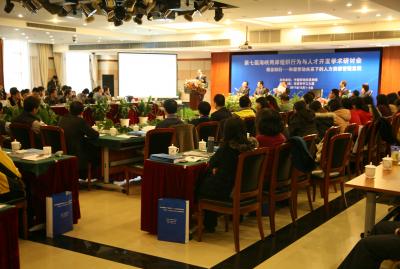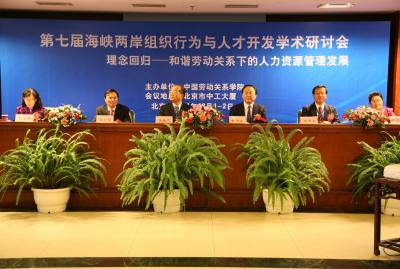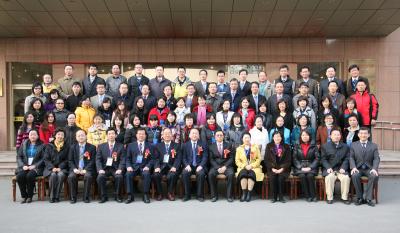On December 1 and 2, the 7th Cross-Strait Academic Conference on Organizational Behavior and Talent Development was grandly held at the Zhonggong Plaza of the China University of Labor Relations (CULR). More than 100 experts and scholars from over 40 universities and research institutes in the Chinese mainland, China's Taiwan Region, Hong Kong Special Administrative Region, and Macao Special Administrative Region, including Renmin University of China, National University of Kaohsiung, Nankai University, National Chung Cheng University, Capital University of Economics and Business, Chang Jung Christian University, Shandong University, National Sun Yat-sen University, Beijing Jiaotong University, Macau University of Science and Technology, and Nanjing University, gathered to discuss and exchange views on the theme of "Returning to the Concept: Development of Human Resource Management in Harmonious Labor Relations".
On the morning of December 1, the opening ceremony of the conference was chaired by Professor Shen Qinqin, Vice President of the CULR. Professor Li Deqi, President of the CULR, and Professor Ing-Chuang HUANG, President of National University of Kaohsiung, delivered speeches. President Li Deqi warmly welcomed the representatives attending the conference, especially those from China's Taiwan Region. He briefly introduced the basic situation of the CULR's history, discipline construction, scale, and faculty, and hoped that all the experts present would speak freely, make friends, and make efforts for the common development of organizational behavior and human resource management disciplines across the Taiwan Straits. President Ing-Chuang HUANG expressed sincere thanks to the organizers for their preparatory work.
In the keynote speech session, Professor Ing-Chuang HUANG gave a speech titled "Application and Development of Human Resource Management in China's Taiwan Region", introducing the evolution of human resource management concepts and practical applications in China's Taiwan Region. Professor Peng Jianfeng from the School of Labor and Human Resources at Renmin University of China delivered a speech titled "Top Ten Focuses of Human Resources in China in 2011 - Current Situation and Trends", providing a comprehensive and insightful analysis of the current hot topics in human resource management. Professor Liang-Chih Huang of National Chung Cheng University delivered a speech titled "The Role and Action of the Government in Human Resource Development under the Harmony of Labor and Capital - Taking China's Taiwan Region as an Example", discussing the role and action of the government from six aspects: the National Manpower Innovation Award, public vocational training, outsourced vocational training, measures to cope with the financial tsunami, other employment measures or guarantees, and the construction of national function standards. Associate Professor Qiao Jian, Director of the School of Labor Relations and Human Resources of the CULR, delivered a speech titled "The Structure of China's Collective Bargaining: From Decentralization to Concentration", introducing that China's collective bargaining system is gradually getting rid of the formalized maladies of the past through the centralized reform of the consultation structure. It has begun to play a more substantive role in the coordination of labor relations. Its mechanism of action is quite different from that of industrialized countries, and it is a comprehensive product of China's economic and political structure at this stage. Associate Professor Pun Ngai of the Hong Kong Polytechnic University gave a lecture titled "Reflecting on Foxconn's Factory Production System", introducing the "Foxconn Survey Report" on the three places across the Taiwan Straits, and explaining Foxconn's factory production system from the following three aspects: Foxconn's expansion process, new factory system and new labor force, and workers' response, showing us the current situation of workers' lives and work under the combined control of transnational capital and local governments.
On the afternoon of December 1 and the morning of December 2, the participating scholars held lively discussions and exchanges on more than 60 papers submitted by the conference on nine topics, including human resource management concepts, human capital and labor economy, talent strategy and public sector management, leadership, university human resource management, organizational incentives and social capital, psychological contracts and team loyalty, labor relations and labor unions, labor dispatch and labor law.
The First Cross-Strait Academic Conference on Organizational Behavior and Talent Development was initiated by Shanghai Jiao Tong University and National Sun Yat-sen University in Kaohsiung, and was held at Shanghai Jiao Tong University in September 2002. Subsequent conferences were successfully held at National Sun Yat-sen University, Shenzhen University, National University of Kaohsiung, Shandong Institute of Economics, and National Chung Cheng University. These conferences have brought together a large number of top experts in the field of organizational behavior and talent development from both sides of the Taiwan Straits, playing a very positive role in promoting academic exchanges and achieving complementary advantages between the educational and business communities on both sides of the Taiwan Straits.
The 8th Cross-Strait Academic Conference on Organizational Behavior and Talent Development will be held at Shanxi University of Finance and Economics.
(School of Labor Relations and Human Resources, Foreign Affairs Office, Department of Scientific Research )



